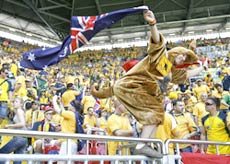Thousands of fans braved the winter cold to gather at pubs, clubs and open-air venues in Sydney and Melbourne, Australia's two biggest cities, while millions more watched on television at home as their team staged a dramatic comeback to beat Japan 3-1.
 The match kicked off at 11 pm in Sydney and 1 am in Melbourne, with some fans carrying sleeping bags as they prepared for a long winter's night.
The match kicked off at 11 pm in Sydney and 1 am in Melbourne, with some fans carrying sleeping bags as they prepared for a long winter's night.
As offices opened for business, many fans were still heading home after celebrating Australia's first World Cup finals victory. They lost two games and drew one in the 1974 tournament.
"We haven't been here in 32 years. We're going to win the World Cup," an unidentified man said as he walked with dozens of jubilant friends down the centre of Sydney's main street amid honking car horns and flares.
"Everyone was just going mental, with flares everywhere and everyone just going really berserk," another fan told Reuters Television as celebrating fans blocked traffic.
Australia's joy contrasted with gloom in Japan, where many believed the match was theirs after Shunsuke Nakamura's controversial early strike.
"Don't ask me anything about the market today," one downcast Japanese oil trader said. "I won't be watching. I don't feel like doing anything."
Australia had failed to score a single goal in 1974 but hammered three in eight minutes past a tiring Japan in their opening Group F match in Kaiserslautern.
'Raining goals after 32 years,' The Sydney Morning Herald said on its front page.
| |||||||||||
'Miracle!' the tabloid Daily Telegraph said. 'Socceroos make history to stun Japan.'
Special praise was reserved for Australia's Dutch coach Guus Hiddink, nicknamed 'Aussie Guus', after his tactical gamble in bringing on goalscorers Tim Cahill and John Aloisi as late substitutes was rewarded.
"I think Guus is indeed a hero, the greatest Dutchman ever created," Labour Opposition MP Anthony Albanese told reporters.
Additional reporting: Linda Sieg in Tokyo







